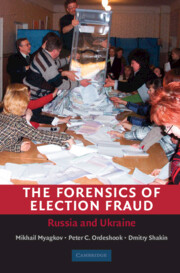3 - Russia
Published online by Cambridge University Press: 03 February 2010
Summary
Never in a single country did the people manifest such activity in elections as did the Soviet people. Never has any capitalist country known nor can it know such a high percentage of those participating in voting as did the USSR.
Andrei Vyshinky (1937)SUSPICIOUS ANOMALIES OF RUSSIAN ELECTIONS
Before applying our forensic indicators to Russia, beginning with its 1995 parliamentary contest through its 2004 presidential election, as well as its 2007 parliamentary vote, it is useful to first consider some auxiliary indicators that, by themselves, give probable cause for believing that those elections were anything but free and fair. We do not do this merely to cast doubt on the democratic legitimacy of Russia's electoral politics, but because we want to use Russia as a test of our indicators since the measure of our confidence in them will depend on the extent that they agree with all other things we know about Russia's political landscape. We also want to take advantage of the fact that by several independent measures, Russia's status as a transitional democratic state fell markedly during Putin's regime. As Freedom House states the matter, “Russia has been included in the Not Free category since 2004, as a function of the systematic erosion of rights, including the flawed nature of Russia's parliamentary elections in December 2003 and presidential elections in 2004, the further consolidation of state control of the media, and the imposition of official curbs on opposition political parties and groups within that country” (Russian Analytical Digest, May 15, 2007).
- Type
- Chapter
- Information
- The Forensics of Election FraudRussia and Ukraine, pp. 71 - 137Publisher: Cambridge University PressPrint publication year: 2009



